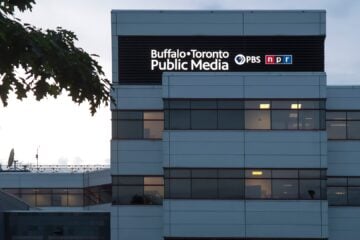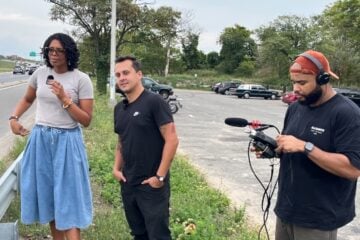How WBUR is getting into the sponsored podcasts business

Conor Doherty
WBUR's CitySpace at the Lavine Broadcast Center.
For the first time, WBUR in Boston is producing podcasts for outside organizations.
The station, producer of original podcasts such as Endless Thread and Circle Round, started production of its first sponsored podcasts last month, creating a new source of revenue. The sponsored podcasts are produced by the organization’s CitySpace Productions team, which it launched during the pandemic to produce live virtual events for outside entities.
WBUR plans to ease into sponsored podcasts with one client and one dedicated staffer, Senior Producer Jay Feinstein, to work on the podcasts. The Shah Family Foundation, which has also provided grant funding to WBUR, was the first client to hire the station to assist with production of two podcasts, Catalysts for Change and Last Night @ School Committee.
While the foundation provides talent for the podcasts, Feinstein works with the organization on everything from big-picture planning to choosing music and editing. When the station was first hired, it recommended podcast equipment and helped the foundation build out its studio space.
“It’s the first time we’ve done this. It’s our first relationship. And so it is proof of concept, effectively,” said Pete Matthews, executive director of business partnerships. “We are working to determine what the long-term growth potential is here.”
The foundation signed a one-year contract for roughly a “few hundred thousand dollars,” said Matthews. He added that the station structured the first contract in a way that “was not going above and beyond what it really costs to do this work.”
Jill Shah, president of the Shah Family Foundation, said in a press release that the foundation wanted to work with WBUR to “expand the reach and impact of these podcasts.”
The idea came about because the foundation was looking for “professional support” for its podcasts, Matthews said. When the foundation approached WBUR for recommendations about who could do that work, “our answer was, ‘Why don’t you come to us?’” Matthews said.
The station decided to get into sponsored podcasts as it looks to develop “revenue streams that are growable, sustainable and different from the successful things we’ve been doing in the past,” he said.
WBUR is not alone in producing sponsored podcasts in public media. National Public Media also created this year its first sponsored podcast, The Upload: The Rise of the Creator Economy with YouTube.
“Branded podcasts are always part of a larger sponsorship campaign,” Bryan Moffett, NPM COO, told Current in an email. “We don’t offer them as standalone products or view them as a separate business line.”
WBUR’s Matthews recognizes that sponsored podcasts are rare in public media. But he said he believes the station can produce them “in such a way that it is entirely separate and distinct from the work that we do as a public media institution.”
One way the station is separating editorial and sponsored podcasts is by ensuring that Feinstein works only on the sponsored podcasts.
The team is also selective about which projects it will take on, Matthews said. The station has not created strict eligibility requirements, but a group comprising CEO Margaret Low and business and editorial leaders will make determinations on a case-by-case basis. And while editorial is not involved in producing sponsored podcasts, Matthews said they should have a say in which clients are hired because “it’s important for us all to be in agreement in the types of partners we work with.”
The group would discuss “the opportunity against the potential opportunity costs, too,” he said. “And not just in terms of revenue, but in terms of what’s the perception of that to our audience? That is core.”
Ben Brock Johnson, who sits on the other side of the firewall as WBUR’s EP of podcasts, told Current that he was “pretty involved in the conversations from jump” about whether the station should move forward with sponsored podcasts.
“I have an incredible amount of confidence … in the current leadership at WBUR to be both extremely careful and responsible with the crown jewel of what we do, which is journalism that is beyond influence,” Johnson said.
Outside organizations regularly seek to partner with the station, Johnson said.
“That’s one of the things that is both exciting and dangerous about a public radio organization in some ways, because you have a lot of people who are interested in burnishing their brands by partnering with you,” he said. “Starting to build out this team in the business partnerships part of our shop actually allows for us to, in some ways, protect ourselves better, because we can steer those conversations to a place.”
As WBUR adds sponsored podcast clients, Matthews said the station will work with “the types of organizations that we see alignment with.” It will consider whether it would accept direct sponsorship from the client and whether the content would be appropriate for its own audience.
“This is a new source of revenue for us, but it should in no way guide our organizational direction,” he said. “It is a way to support our mission, but it is not leading that.”






